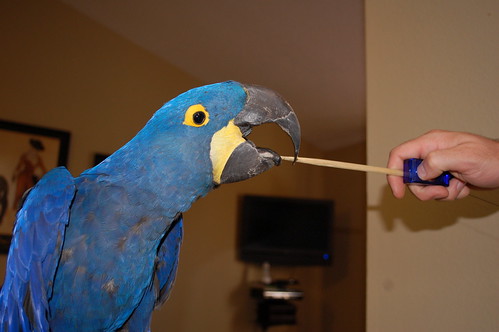
Hyacinth macaw
If I’m going to be honest, I have to admit that I used to have a real problem with the idea of a training diet. It seemed unthinkable that a bird, virtually a wild animal in terms of its lack of domestication, should be locked in a cage and then denied food, something it would be free to acquire in the wild. It is psychologically damaging for any sentient being to be kept at another’s mercy, how could this ever be considered a good thing?
Training bridges a gap, fills in the blanks in the relationship between a human and a parrot. Where there was an inability to communicate, there is now established a “language” that both could understand and build a relationship around. Instead of looking at each other like aliens, you and your bird are comrades, teammates. It changes everything.

Blue and Gold Macaw
Of course, I wanted this for me and my bird, but I didn’t want to have to starve him to get there. I was afraid that while I was laying the groundwork for communication, that I would be violating the very basic understanding and trust that I would care for him and see to his needs. One step forward and two steps back – it didn’t seem worth it.
It took me a while to come around to the notion that food management did not equal suffering, but I had to let go of some of my “old” thinking to reach that conclusion.

Budgie
My first hint came when I began studying the habits of wild birds – looking at the ways they spent their time and realizing the difficulties they face everyday. Life in the wild isn’t easy. There are times when food sources are not abundant and birds may go to roost at night having had barely enough food to get by.
With the best intentions at heart, we have the tendency to feel that we owe our birds the ultimate in comfort in our homes. There are likely many different reasons for that thinking, but this is not necessarily what is best for our birds. It is unnatural for birds NOT to work for their food, which never, ever appears to them in the wild by way of a hand out.
When done properly, food management will teach your bird to see his empty food dish as an opportunity to train – something he will anticipate as the bonding and learning experience it is, but also as a way to earn his food.

Congo african grey
Trainers will refer to “motivation” in the training diet. This speaks to the level of hunger your bird is experiencing. A properly motivated bird is hungry enough to want to train and be eager to go through the steps. A bird that is too hungry will be uncoopereative and unwilling to “earn” food. Letting your bird get to that point is not only unproductive from a training standpoint, but it will damage your relationship with your bird.
If you are doing it right, your bird should never even be aware that you are managing his food. Using measurement, and through trial and error, you can get a fairly accurate idea of how much your bird eats and limit his portions to only that amount.
You never want to take your bird’s food away, instead, you want it to run out. There is different psychology involved between the two actions. When you remove a dish from your bird’s cage containing food, you might be presumed to be the cause of your bird’s hunger. If the food runs out, there is simply no food, just an empty bowl. Once you begin training, your bird will see the empty bowl as an opportunity, as I said before.

Blue throated macaw
Another advantage, two actually, in using a training diet and feeding your bird at a later time in the day is that: 1) your bird loses his expectation for timely feeding, something else that rarely happens in the wild. He will no longer call out demanding to be fed when he sees the first rays of dawn or at another time of his choosing, and 2) if you feed him just before he normally starts his sundown calls, it can eliminate a potentially loud and unnerving part of the day for your neighborhood.
I promise you that your bird will not starve to death if you don’t place a bowl of food in the cage at the crack of dawn, or even at the crack of noon. After observing how food management lends itself to the training experience, I now know that it does not cause hardship, but helps to set the stage for success in what is one of the most rewarding parts of your bird’s life.
Author Patty Jourgensen specializes in avian health, behavior and nutrition and has been working with and caring for rescue birds since 1987.


10 comments
Leave a comment